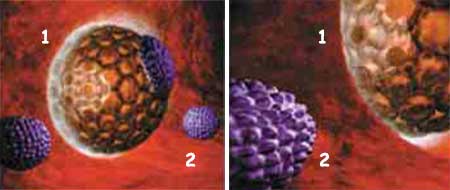Although the cells of a developing embryo, preparing to settle in the walls of the womb are genetically different to those of the mother, they are not rejected in the same way that an organ or tissue transplanted into the body will be. This fact remained a mystery for a long time. G. L. Flanagan sets out the answer in his book, Beginning Life:
... The cell cluster suppresses its genetic markers and instead gives out special signals that can be compared to a universal password. This password is the same for all people and is the same one that the mother’s cells expressed when she herself was just such a cluster. Therefore, her cells do not now mobilize defences against the new arrivals, because they biologically recognize the nesting cluster as universal friend, not foe.29
 | |
| 1. Egg cell | 2. Defense cell |
| The mother's defense cells approach to eliminate the embryo (left). However, thanks to the perfect creation in the body, they are unable to harm the egg. | |
There’s one very important point here. The way a collection of cells can send a universal message, as Flanagan puts it, and that their message can be understood by other collections of cells, which then know whether they’re dealing with friend or invader, is a truly great miracle. It must not be forgotten that the “societies” in question consist not of human beings, but tiny cells with no hands, eyes, ears or brains, invisible to the naked eye, themselves made up of unconscious atoms, molecules and proteins. It would be completely illogical to expect such a display of awareness from cells.
The way that the embryo is able to settle in the mother’s womb with no difficulty, and to survive there, takes place by the mercy of God, Who creates everything—the embryo, the mother, and the defense system in the mother’s body.
Truly God has knowledge of the Hour and sends down abundant rain and knows what is in the womb. And no self knows what it will earn tomorrow and no self knows in what land it will die. God is All-Knowing, All-Aware. (Surah Luqman, 34)